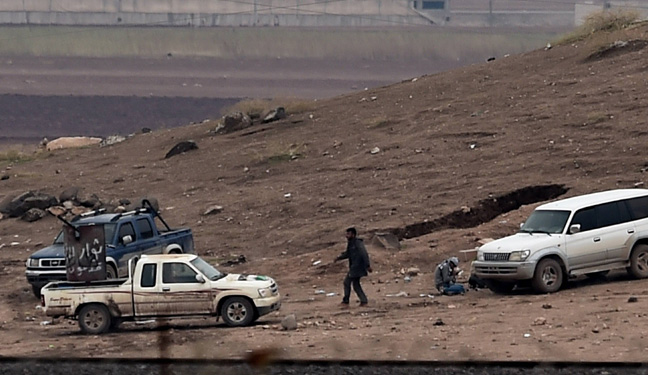
Iraqi security forces launched an operation on Friday aimed at regaining ground from the Islamic State terrorists group north of the militant-held city of Tikrit, officials said.
Security forces backed by air support have begun “an operation to liberate areas north of the city of Tikrit,” said Ali Mussa, an adviser to the governor of Salaheddin province, where the operation is taking place.
An army lieutenant colonel also confirmed the launch of the operation north of the city, which was seized on June 11 during a sweeping ISIS-led militant offensive that overran large areas of the country.
The officer said that security forces were moving slowly toward the militant-held Baiji district due to bombs along the way, and were also advancing west of Tikrit.
A US-led coalition is carrying out air strikes against IS forces in both Iraq and Syria, where the group also holds significant territory and Iraqi troops have struggled to retake and hold ground.
Iraqi officials in the western Anbar province say a curfew has been imposed in the provincial capital Ramadi over fears that the ISIS group might try to advance on the city.
Sabah Karhout, the chairman of the Anbar provincial council, says the curfew began at midnight Friday as part of an effort to limit movement in and out of the city.
The ISIS group has been making gains around Ramadi in recent weeks against the Iraqi military, despite ongoing U.S.-led coalition airstrikes on the militants.
As fighting raged on several fronts, Al-Qaeda’s deadly Yemen-based franchise urged Muslims worldwide to support the IS “jihadists” in Syria and Iraq.
Syrian Kurdish YPG fighters rides a vehicle in the western outskirts of the Syrian town of Kobane, also known as Ain al-Arab, on October 17, 2014. A US commander said on October 17 that “encouraging” signs were coming from the Syrian border town.
The US commander overseeing the air war hailed “encouraging” signs in the efforts to defend Kobane, but said the town could still fall to extremists and that confronting IS in Iraq was the coalition’s top focus. “Iraq is our main effort and it has to be,” General Lloyd Austin said.
Six US-led coalition air strikes hit IS positions in the east of Kobane on Friday, taking advantage of new coordination with the town’s Kurdish defenders, the Syrian Observatory for Human Rights said.
The Observatory said IS fighters were now being trained to fly three fighter jets seized from the Syrian military and former Iraqi army officers who once served under Saddam Hussein were supervising the training at the Jarrah military airport in the northern province of Aleppo.
In Iraq security forces on Friday fought IS terrorists in the strategic city of Ramadi, the capital of Anbar province, is one of a dwindling number of areas in the region where pro-government forces still hold ground, and its loss would be a major blow for Baghdad.
But the US military said that Baghdad was not under “imminent threat” from the terrorrists, despite a string of deadly car bombs in the Iraqi capital.”There are not masses of formations of (IS) forces outside of Baghdad about to come in,” spokesman Rear Admiral John Kirby said.
‘Bodies in streets’
Kobane district chief Anwar Muslim said the US-led strikes had destroyed many IS vehicles and artillery pieces. “You can see their bodies in the streets… Our forces are reinforcing their defensive positions,” he told AFP.
Muslim said sniper and mortar fire from terrorists was preventing authorities from evacuating civilians caught up in the battle. “Their situation is difficult,” he added.The PYD has been appealing urgently for weapons to resupply its outgunned fighters in Kobane, but Washington said it was too early to discuss the request.
The Kurds claimed to have pushed IS back in parts of Kobane as the coalition intensified its air strikes in recent days.The month-old IS assault on the area has sparked an exodus of some 200,000 mainly Kurdish refugees across the border, where the town’s plight has stoked nationalist sentiment among Turkey’s own large Kurdish minority.







